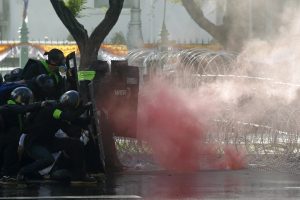Thai police deployed rubber bullets, teargas, and water cannon to disperse hundreds of demonstrators who attempted to march on Prime Minister Prayut Chan-o-cha’s office yesterday to demand that he resign over his handling of the COVID-19 pandemic.
Defying new coronavirus restrictions banning gatherings of more than five people, the demonstrations also called for cuts to the budget of the military and the Thai monarchy – the two most powerful institutions in Thai politics – and for the import of mRNA coronavirus vaccines to fight a cresting wave of COVID-19 infections.
Protesters, some wearing gas masks and hard hats, piled mock body bags doused with red paint near the Democracy Monument, which sits in a traffic circle at the confluence of two major roads in central Bangkok.
According to Reuters, which put the total crowd at more than 1,000, police intervened with the aforementioned forceful means after some protesters tried to dismantle barbed wire and metal barricades set up by authorities to block roads leading from Democracy Monument to Government House, which houses Prayut’s office.
Sunday’s rally was led by Free Youth, a student protest group that was one of the driving forces behind last year’s wave of anti-government protests, which drew crowds of tens of thousands to press calls for the resignation of Prayut, who first came to power in a 2014 coup, and the creation of a new and genuinely democratic constitution. Key activists also aired combustive calls for reform of the nation’s monarchy, courting prosecution under Thailand’s severe lese majeste law, which outlaws any criticism of the king or royal family.
The anger that stoked last year’s protests has since shaded into a wider anger at the Prayut administration’s failures to contain COVID-19, which many activists view as exemplifying the mix of elite complacency and cronyism that they are seeking to reform. “We will die from COVID if we stay home, that is why we have to come out,” shouted a protest organizer during yesterday’s demonstration, according to Agence France-Presse.
Thailand is just one of the many Southeast Asian nations that are struggling to stave off a COVID-19 tragedy, as the Delta variant of the virus leaps across the region.
Sunday’s rally came as Thailand recorded 11,397 new cases of COVID-19, its third consecutive day of record infections, and announced an expansion of restrictions, introducing travel curbs and mall closures and extending night-time curfew to three more provinces. (Bangkok and nine other provinces have already been under these restrictions, which also include bans on gatherings of more than five people, since July 12.) Today, Thai health authorities announced a further daily record of 11,784 infections and 81 deaths.
As the situation in Thailand has worsened, the Thai government has come under increasing pressure for failing to secure adequate vaccine supplies, squandering the nation’s successful containment of the virus last year. The country has so far managed to fully vaccinate just 4.9 percent of its population, according to the Our World In Data tracker.
The government rollout has also been hobbled by Thailand’s heavy reliance on two vaccines. The first is the Chinese-made Sinovac vaccine, whose efficacy against the new Delta variant is now being called into question. The second is AstraZeneca, which is being produced locally by Siam Bioscience, a local company owned by the Thai king with no experience in vaccine manufacture. (One opposition politician who questioned the transparency of the deal was charged with lese majeste.)
Whether Thailand’s protests command the support of a majority of the Thai population remains unclear. What is clear is that the anger against Thailand’s encrusted ruling establishment, and the cynosure of the monarchy, will not be quelled with pressurized water cannon and teargas alone. Indeed, there are signs that the frustration will only grow as long as COVID-19 continues its lethal migration across the country. Today on Thai Twitter, the hashtag #ล้มราชวงศ์จักรี was trending, having racked up 1.17 million tweets in less than 24 hours. The phrase translates as “overthrow the Chakri dynasty.”

































